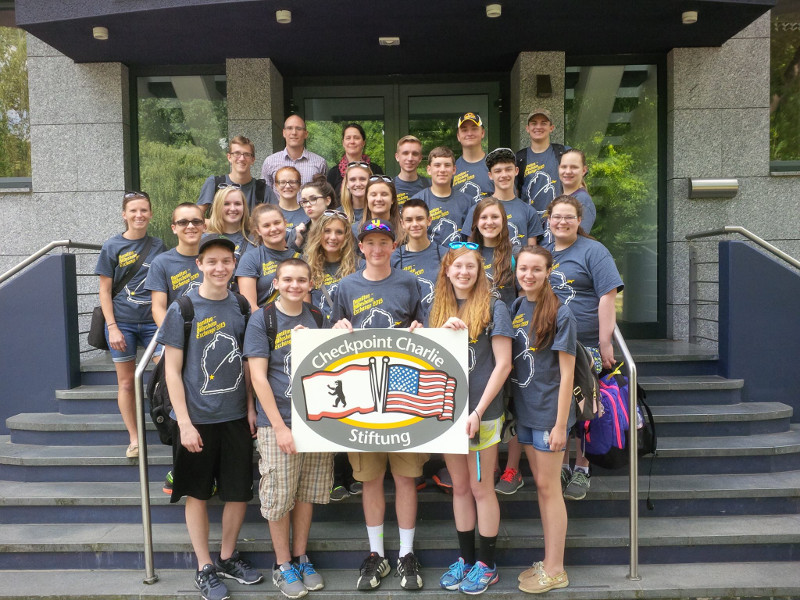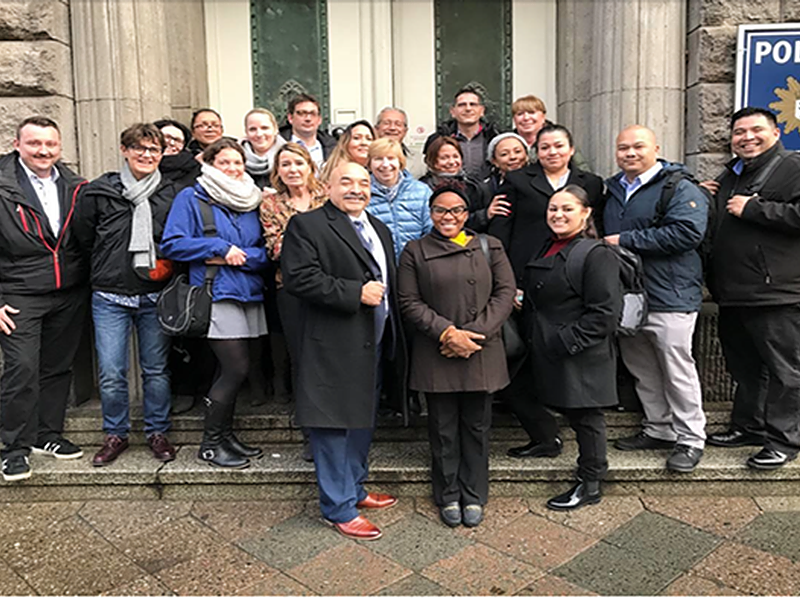
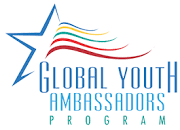
Global Youth Ambassadors Program 2021
Die Checkpoint Charlie Stiftung förderte dieses Jahr zum zweiten Mal das „Global Youth Ambassador Program (GYAP)“, das sich dezidiert an High School Schüler*innen aus eher benachteiligten Schichten wendet. An dem einmonatigen Sommerprogramm, genannt “Atlanta – Germany: Peer Exchange Program“, nahmen 25 High School Schüler*innen teil. Die anhaltenden internationalen Reisebeschränkungen aufgrund der COVID-19 Pandemie hatten GYAP dazu gezwungen, das Programm online und virtuell umzusetzen. Ein Teil des Programmes bestand aus täglichem Deutschunterricht einer Sprachenschule in Berlin. Neben dieser Vermittlung der Grundkenntnisse der deutschen Sprache in digitalen Sprachkursen, ging es aber ebenso um die Verbesserung des kulturellen Verständnisses von Deutschland, so dass amerikanische Studenten die Gemeinsamkeiten und Unterschiede zwischen der amerikanischen und deutschen Kultur erkennen können. Dafür konnte die Stiftung drei besondere und sehr unterschiedliche Referent*innen gewinnen, die jeweils aus ihrer Perspektive und Erfahrung Einblick in die deutsche Wirklichkeit gaben und den Fragen der Schüler im Anschluss zur Verfügung zu standen, bevor diese dann untereinander das Thema diskutieren.
Unsere Kuratoriumsvorsitzernde Sawsan Chebli sprach zu dem Thema:
Bürgerschaftliches Engagement als integraler Bestandteil einer funktionierenden Integration.
Die Künstlerin, Aktivistin, und Gründerin von „Politaoke“ sowie von „Artists Without a Cause“ Diane Acre sprach zu dem Thema:
Die versuchte Auslöschung des Wortes Rasse in Deutschland und die Angstmacherei der USA vor der kritischen Rassentheorie: Der Kampf um Gleichheit, wenn die Sprache zur Waffe wird.
Marc Holland-Cunz und Niloufar Shabanpour, von dem Projekt „Withwingsandroots“, das ebenfalls von der Checkpoint Charlie Stiftung unterstützt wird, sprachen zu dem Thema:
Transatlantische Vergleiche der Rassenungerechtigkeit in Deutschland, Südafrika und den Vereinigten Staaten
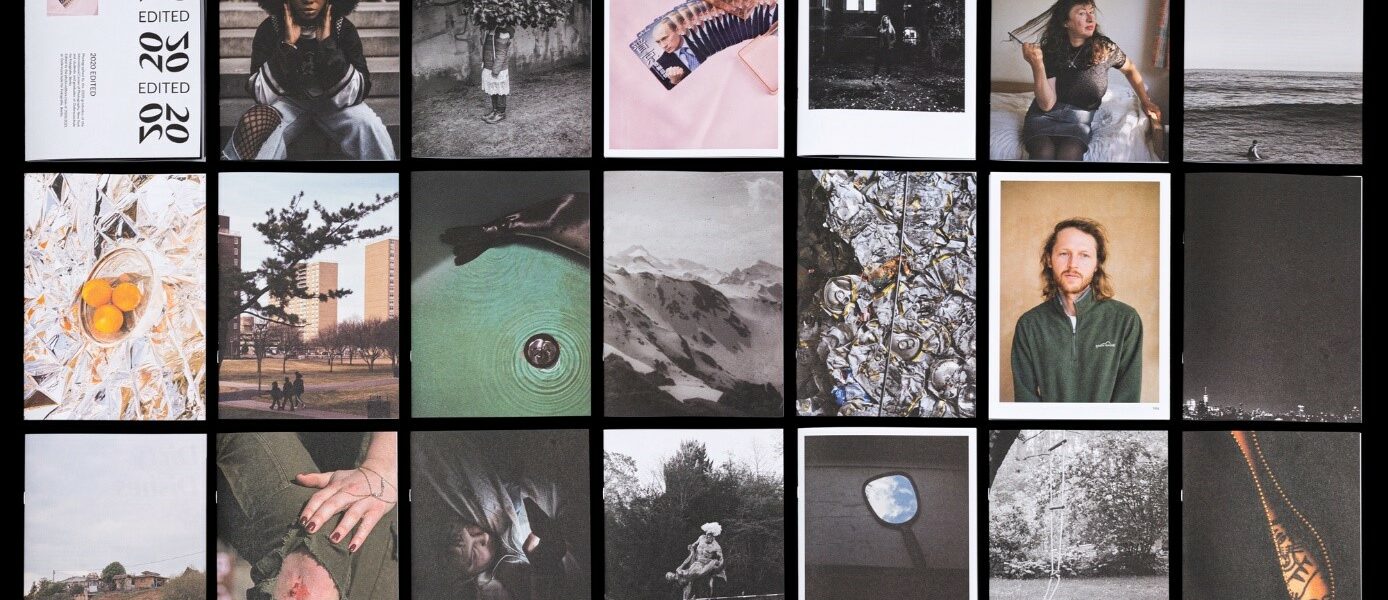
2020 Edited
„2020 Edited“ ist ein gemeinsames Fotoprojekt der Berliner Ostkreuzschule für Fotografie (OKS) und des International Center of Photography (ICP) mit Sitz in New York City. Die Druckkosten der herausragenden Arbeiten wurden teilweise von der Checkpoint Charlie Stiftung finanziert. Zehn Fotografen jeder Institution haben individuelle Geschichten aus dem Jahr 2020 geschaffen, die ihre ganz eigenen Erfahrungen und Eindrücke in verschiedenen Teilen der Welt widerspiegeln. Es ist das zehnte Jahr der Zusammenarbeit der Institutionen unter dem Titel „New York Edited“, initiiert von Nadja Masri. Aufgrund der besonderen Umstände inmitten der Pandemie ist das diesjährige Projekt insofern anders, als dass die Fotografen Momente während ihrer Zeit zu Hause und außerhalb ihrer Schulen festhielten. Zum ersten Mal sind Fotografen aus beiden Schulen vertreten; die Auswahl und Bearbeitung erfolgte durch Redakteure von OKS in Berlin. Wir möchten alle dazu ermutigen, sich die Fotos und das Video auf der Projektwebsite 2020edited.com anzuschauen. Mehr über die Ostkreuzschule für Fotografie in Berlin erfahren Sie auf deren Facebook-Seite:
https://de-de.facebook.com/Ostkreuzschule.
Projektanträge III/2024
Die nächste Vorstandssitzung wird im September 2024 stattfinden. Bitte reichen Sie bis ihre Anträge bis spätestens 23. August ein.
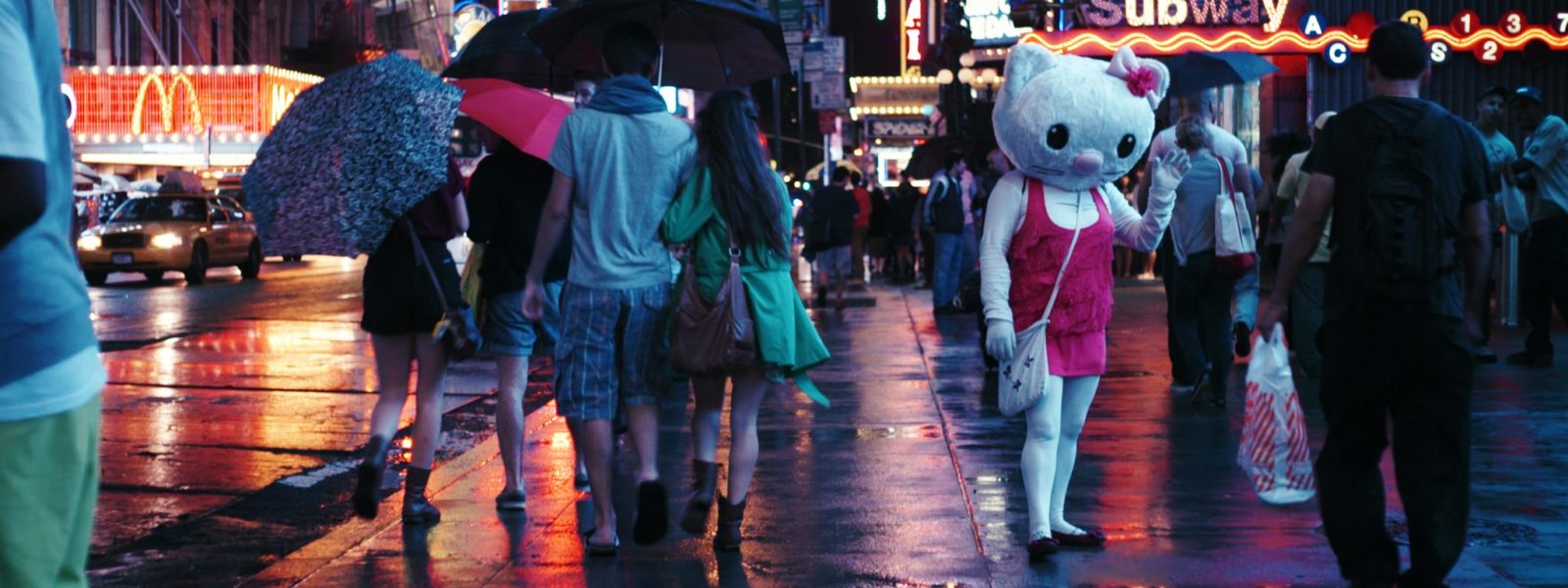
Playland USA
This past weekend’s virtual film festival for the month of April hosted by New Filmmakers Los Angeles featured a screening of Benjamin Schindler’s experimental documentary “Playland USA” and a Q&A session with the German director. The documentary will also serve as the basis for discussion at the upcoming symposium “Welcome to our World” initiated by Benjamin Schindler and aided by the Checkpoint Charlie Foundation. Our intern Jens Evers was there online. Here are his impressions.
“Playland USA” presents American history along the lines of fact and fiction, as well as stage and real life. These lines are increasingly blurred and reenactment, imagination and reality become intertwined.
The documentary was filmed at a variety of sites. These are often sites of re-presentation or reenactment of history. The colors, effects and transitions are what characterizes the film that evolves around key events such as the first settlement, the declaration of Independence and the first landing on the moon. Recurring themes are expansion, progress, hope, ‘The American Dream’ and values. ‘Playland USA’ exclusively makes use of footage shot by Schindler and his team in 2012, and, in most parts, in 2017 during an eight-week travel through the United States. Benjamin Schindler wanted the film to reflect the movie world and American popular culture and how people live in their own world – a sort of dream world. The background for the development of the script, he told the audience, was the question of how the United States turned into a movie nation and a place of illusion and myth. The goal for him and his team was to create a documentary that would slowly drift away from reality. The filmmaker interviewed numerous people who shared their very own perspective on life and reality. The viewer, however, is confronted with these worldviews without commentary or filter. Schindler wanted to give his audience a chance to interpret and evaluate without guidance and contextualization, he explained.
While it is the experimental and alternative style that makes “Playland USA” so intriguing, it is also what made acquiring funds quite difficult for the team. Schindler stressed the difficulties of finding support for an experimental film that defies genre categorizations. Nonetheless, German public broadcasting would eventually fund the project that, in total, took seven years of planning, filming and editing until its first screening. Schindler emphasized the importance of seeing the world through “cinematic glasses” as the foundation of working on a project like this.
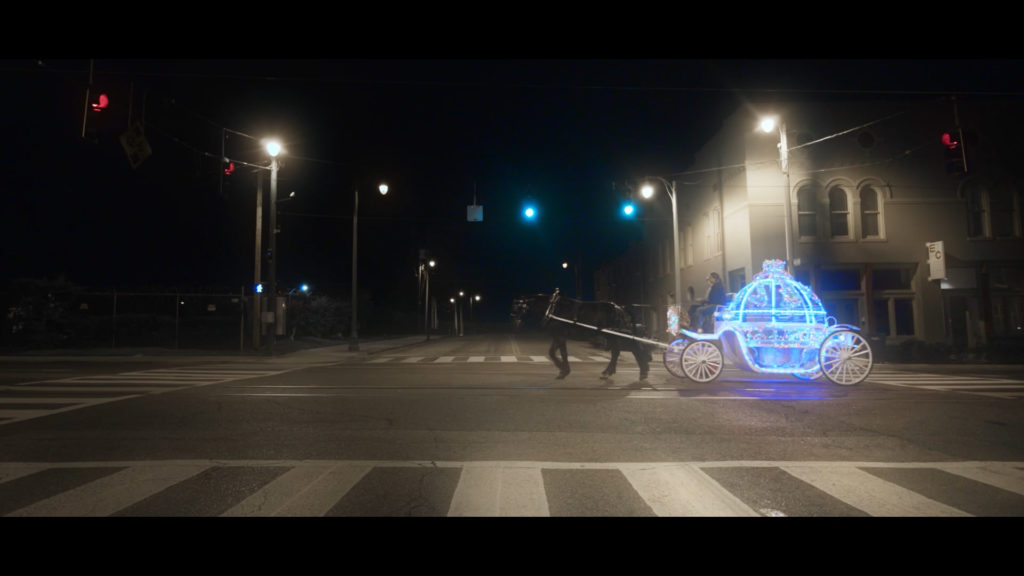
Source: https://www.facebook.com/playlandusafilm/photos/pb.484902672279771.-2207520000../944598872976813/?type=3&theater
Source picture 2 (cat mascot): https://www.facebook.com/kinogermanynow/photos/gm.197579598805931/3960630527314080
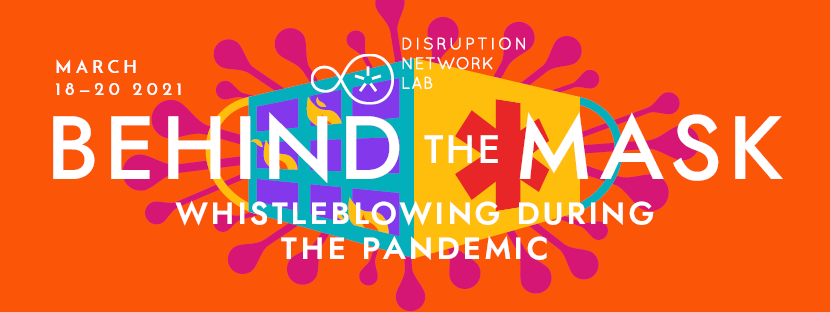
Behind the Mask – Whistleblowing during the Pandemic
The Disruption Network Lab (DNL) is a non-profit organization based in Berlin. It was founded in 2014. The organization’s primary objective is to promote freedom of speech and exposing systemic wrongs in our society through a participatory and interdisciplinary approach. The “Tactics of Empowerment” event series was launched in 2020 and runs through 2023.
“Behind the Mask. Whistleblowing during the Pandemic” – March 18 – 20 2021
WHISTLEBLOWING & COVID-19: Telling the Truth at the Center of Crisis
This keynote event was moderated by Delphine Halgand (Director of the Signals Network, an organization connecting whistleblowers and international media; thus, working to make information accessible and to support whistleblowers in their individual situation) and featured Eileen Chubb and Erika Cheung. Eileen Chubb spoke out on the abuse of elderly in care homes back in 1999 and continues to support whistleblowers in the healthcare sector in the UK. She is the founder of the organization “Compassion in Care”. Erika Cheung was a whistleblower in the scandal around the blood diagnostics company “Theranos”. She revealed the astonishing lack of accuracy of the company’s newly development blood diagnostics devices after quality control samples had brought different results each time they were run through a test. Cheung is now the director of “Ethics in Entrepreneurship”, a non-profit organization advocating a new ethical approach for stakeholders and focusing on start-ups.
Delphine Halgand introduced the two participants and the topic to the audience. She started off by defining what ‘whistleblowing’ actually meant, referring to the definition of the Council of Europe. Two aspects of this definition were emphasized: Whistleblowing has to be considered a selfless act and surfaces information that is beneficial to the public in general. In the context of Covid-19, Halgand pointed out the lack of transparency in many regards and on many levels, as well as the lack of whistleblower protection. Then, Chubb and Cheung were given the opportunity to introduce themselves, their individual history of becoming a whistleblower and their current projects and objectives.
One of the main concerns for Eileen Chubb, both in the past and in her present work, is the lack of follow-up investigation of concerns and issues voiced by healthcare workers. The Covid crisis clearly surfaced the problems in public health in the UK and elsewhere. Systemic wrongs are now being more visible to the public, she argued. Chubb stressed the importance of legislation that better protects whistleblower and creates a framework for when a case has to be taken to court. Whistleblowers do not intend to take matters to court, their primary goal is to see improvements or an end of the wrongs they were forced to make public, Chubb further pointed out. Similar to Chubb, Erika Cheung experienced that internally addressing her observations did not suffice. The issues she addressed were evidence-based and yet dismissed. Rather than investigating the issue at hand, the company threatened to sue her. She concluded that the Theranos failure was an ethical collapse and not primarily a technological or economical one.
Following up on the individual presentations, moderator Delphine Halgand led an open discussion on whistleblowing in these times. The panel was concluded by questions the audience had been able to submit via chat on the Disruption Network Lab website. Erika Cheung highlighted the need to make whistleblowing more commonplace and to create structures and channels for whistleblowers. The goal of her organization’s work with start-ups is to create an environment of transparency and safety within an enterprise, thus enabling people to speak up and address issues internally. With the situation as it is right now, Eileen Chubb viewed the media as an important piece, as her organization is working with trusted journalists. Chubb emphasized the interconnectedness of whistleblowing and the freedom of press in this context.
Both Chubb and Cheung agreed on the role of society when it comes to whistleblowing (a discussion question of moderator Delphine Halgand): More education on what whistleblowing actually is and does is crucial for the future.
DIGGING DEEPER INTO HEALTHCARE: The Vaccine Rollout, Pandemic Journalism & Corruption
Moderated by Jonathan Cushing, head of the Transparency International Health Programme (UK), this panel featured independent global health expert Sarah Steingrüber, investigative journalist Serena Tinari and film maker Alexander Nanau.
Sarah Steingrüber provided the audience with key information on the vulnerability of health systems and global medical supply chains in respect to a lack of transparency and the problem of individual enrichment at the expense of public health. No sector is spared from corruption of some sort, she emphasized. This included the areas of financing, governance, workforce and information. The pandemic increases the system’s vulnerability further, since a decrease of restraints opened the door to exploitation, fraud etc. In relation to Covid vaccines and the vaccine rollout, Steingrüber highlighted that, while the level of transparency in research and distribution is quite high, details on pricing and contracting remain under disclosure. The looming issue of vaccine inequity could be solved by creating a Medicines Patent Pool that would enable other fabricants to produce the vaccine – while not endangering economic success of the developers. Steingrüber strongly favored this concept and stressed that this is “a political choice”, bringing up the example of the polio vaccine that has never been patented.
Serena Tinari brought attention to the importance of evidence-based research on Covid-19 and explained what constitutes evidence-based research. This included the subcategories of “best evidence” (e.g. Randomized Controlled Trials (RCT)) and “less solid evidence” (e.g. case studies). Tinari stressed that expert opinion in and of itself does not constitute reliable evidence. It is also crucial to differentiate between the expertise of virologists compared to infectious disease epidemiologists – to only name two professions. The latter are more specialized and thus can offer a more profound take on the pandemic crisis we are facing: “Not all experts are experts in public health and in this context”, she added. The investigative journalist criticized the lack of funding for research conducting necessary studies. For instance, she mentioned the lack of RCT on the effects the wearing of masks has in preventing the spread of the virus. The responsibility of the media, according to Tinari, is to ask tough questions instead of simply reiterating press releases.
Alexander Nanau is the director of the critically acclaimed documentary “Collective” that followed Romanian investigative journalists in their uncovering of a political public health scandal following a fire at a Bucharest night club. A Romanian doctor had revealed that with the right care and procedures the hospitalized victims of the fire should have been able to recover well. This scandal and the investigations helped reveal corruption and collusion in Romanian politics and public health. Nanau criticized the lack of transparency that was still an issue during this pandemic, in Romania and elsewhere. He emphasized the need for journalists who develop background knowledge on health care and public health.
In the following discussion Jonathan Cushing asked the participants if there could ever be too much transparency. The panel participants stressed the importance of transparency and rejected the idea that holding back information could ever serve the public. It was also agreed upon that the current crisis could present a chance for improvement of the health care systems. Sarah Steingrüber pointed out that the crisis had most likely raised awareness to the importance of public health, since the present situation revealed how intertwined public health and the economy are. The objective should be to continue fighting corruption and to increase funding in order to do so successfully. Serena Tinari called for more in-depth analysis of health care issues, as we should not see the Covid crisis as an isolated issue. Alexander Nanau saw a chance for the public to learn more about the healthcare system, which could force changes.



